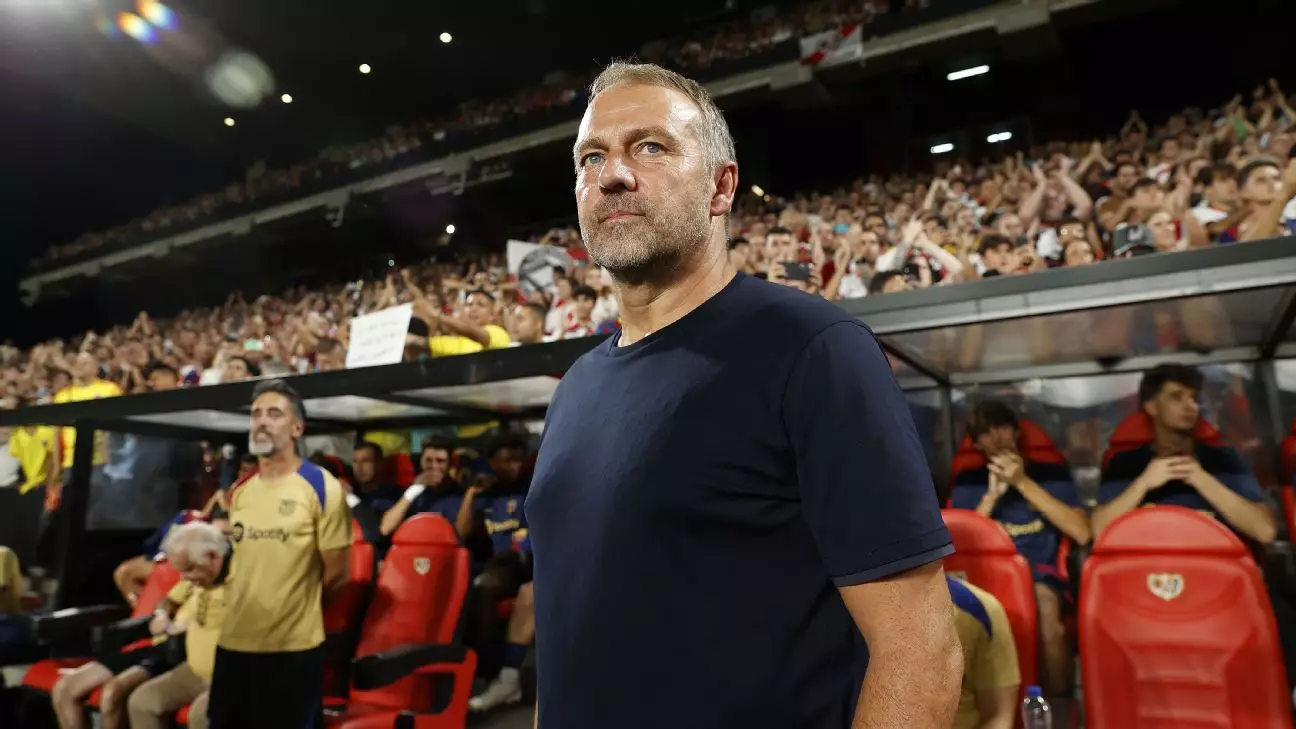In an unexpected turn of events, FC Barcelona suffered a 4-2 defeat against Osasuna that brought their seven-game winning streak in La Liga to a screeching halt. This result marked the first loss of the season for the Catalan giants, leaving fans and analysts alike questioning the strategy employed by coach Hansi Flick. In the aftermath of the match, Flick took full responsibility for the defeat, emphasizing the necessity of squad rotation amid a packed schedule. Let’s delve deeper into the implications of this match and examine the broader context of Barcelona’s current situation.
This loss highlighted the delicate balance that managers must maintain when making decisions about team rotation. With fixtures coming thick and fast, particularly during busy periods including the Champions League and La Liga, maintaining player fitness is paramount. Flick’s decision to rest key players, including Lamine Yamal and Raphinha, came after a hard-fought victory against Getafe midweek. In hindsight, while it was a calculated risk, it proved detrimental against a spirited Osasuna side that capitalized on their opportunities.
Flick acknowledged, “If you want to blame someone for this defeat, blame me.” This statement reflects an important aspect of football management: accountability. Coaches must navigate complex decisions that can significantly alter the outcome of matches. Yet, on the other side of this discussion is the necessity for depth in the squad—a concern that Barcelona has grappled with this season. The lack of substitutes who can perform at the same level as the starting eleven has been glaring and underscores the challenges of squad depth that many elite clubs face.
Barcelona fell behind early in the match, a setback that immediately put pressure on Flick’s rotation strategy. Ante Budimir’s opening goal was just the beginning, followed shortly by Bryan Zaragoza’s strike that left the visitors reeling. Flick’s lineup changes—five players new to the starting eleven—left the team vulnerable, particularly in defense where the absence of regular starters was keenly felt.
While Pau Víctor’s goal did reignite hopes of a comeback, the penalty awarded to Osasuna when Sergi Domínguez fouled Budimir effectively crushed those aspirations. A key takeaway from this encounter is the importance of maintaining coherence and familiarity within the squad. A team that regularly plays together develops an understanding that can be crucial in high-pressure scenarios, something that was visibly lacking during this match.
In the wake of any defeat, reflective analysis is essential for growth. Flick expressed a determination to learn from this experience, stating, “I will analyze the match.” This self-reflection is vital not just for him but for the entire squad as they face crucial upcoming fixtures against Young Boys in the Champions League and Alavés in La Liga. The reality is that this loss should serve as a wake-up call—a reminder of the importance of equilibrium between rotating players and maintaining competitive integrity.
Looking down the road, Barcelona’s plight may become more manageable with the expected return of several injured players post-international break. The likes of Frenkie de Jong and Dani Olmo will undoubtedly bolster the squad’s strength, allowing for more strategic rotations and perhaps alleviating some pressure from Flick.
Despite the clear setbacks, Flick remains optimistic about his team’s potential. In the press conference, he reiterated his commitment to a positive outlook and the belief that the squad is on the right track. It’s essential for players and coaching staff to maintain confidence and resilience—even in the face of defeat. The road ahead will include challenges, but succumbing to negativity is not an option for a club of Barcelona’s stature.
Looking ahead, they will need to regroup quickly to reclaim their momentum. The upcoming matches will be critical not just for points, but for the psychological fortitude of the team. There’s an undeniable need for Barcelona to cement their status at the top of the table, especially with rivals like Real Madrid and Atlético keeping pace closely behind. The season is far from over, and while this defeat may sting, it also offers foundational lessons for the journey ahead.
The match against Osasuna serves as a compelling case study on rotation, squad depth, and the accountability of management. Barcelona must learn from this experience to ensure that they can leverage their skill and resolve in future outings, turning a disappointing moment into a stepping stone for success.

